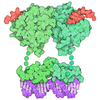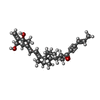Entry Database : PDB / ID : 5zwhTitle Covalent bond formation between histidine of Vitamin D receptor (VDR) and a full agonist having an ene-ynone group via conjugate addition reaction 13-meric peptide from DRIP205 NR2 BOX peptide Vitamin D3 receptor Keywords / Function / homology Function Domain/homology Component
/ / / / / / / / / / / / / / / / / / / / / / / / / / / / / / / / / / / / / / / / / / / / / / / / / / / / / / / / / / / / / / / / / / / / / / / / / / / / / / / / / / / / / / / / / / / / / / / / / / / / / / / / / / / / / / / / / / / / / / / / / / / / / / / / / / / / / / / / / / Biological species Rattus norvegicus (Norway rat)Homo sapiens (human)Method / / Resolution : 2.38 Å Authors Yoshizawa, M. / Itoh, T. / Anami, Y. / Kato, A. / Yoshimoto, N. / Yamamoto, K. Funding support Organization Grant number Country
Journal : J. Med. Chem. / Year : 2018Title : Identification of the Histidine Residue in Vitamin D Receptor That Covalently Binds to Electrophilic LigandsAuthors : Yoshizawa, M. / Itoh, T. / Hori, T. / Kato, A. / Anami, Y. / Yoshimoto, N. / Yamamoto, K. History Deposition May 15, 2018 Deposition site / Processing site Revision 1.0 Jul 18, 2018 Provider / Type Revision 1.1 Aug 8, 2018 Group / Database references / Category / citation_authorItem _citation.journal_volume / _citation.page_first ... _citation.journal_volume / _citation.page_first / _citation.page_last / _citation.title / _citation_author.identifier_ORCID Revision 1.2 Oct 23, 2024 Group / Database references / Structure summaryCategory chem_comp_atom / chem_comp_bond ... chem_comp_atom / chem_comp_bond / database_2 / pdbx_entry_details / pdbx_modification_feature Item / _database_2.pdbx_database_accession / _pdbx_entry_details.has_protein_modification
Show all Show less
 Yorodumi
Yorodumi Open data
Open data Basic information
Basic information Components
Components Keywords
Keywords Function and homology information
Function and homology information
 Homo sapiens (human)
Homo sapiens (human) X-RAY DIFFRACTION /
X-RAY DIFFRACTION /  SYNCHROTRON / Resolution: 2.38 Å
SYNCHROTRON / Resolution: 2.38 Å  Authors
Authors Japan, 1items
Japan, 1items  Citation
Citation Journal: J. Med. Chem. / Year: 2018
Journal: J. Med. Chem. / Year: 2018 Structure visualization
Structure visualization Molmil
Molmil Jmol/JSmol
Jmol/JSmol Downloads & links
Downloads & links Download
Download 5zwh.cif.gz
5zwh.cif.gz PDBx/mmCIF format
PDBx/mmCIF format pdb5zwh.ent.gz
pdb5zwh.ent.gz PDB format
PDB format 5zwh.json.gz
5zwh.json.gz PDBx/mmJSON format
PDBx/mmJSON format Other downloads
Other downloads https://data.pdbj.org/pub/pdb/validation_reports/zw/5zwh
https://data.pdbj.org/pub/pdb/validation_reports/zw/5zwh ftp://data.pdbj.org/pub/pdb/validation_reports/zw/5zwh
ftp://data.pdbj.org/pub/pdb/validation_reports/zw/5zwh Links
Links Assembly
Assembly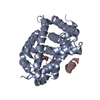
 Components
Components

 Homo sapiens (human) / Production host: synthetic construct (others) / References: UniProt: Q15648*PLUS
Homo sapiens (human) / Production host: synthetic construct (others) / References: UniProt: Q15648*PLUS X-RAY DIFFRACTION / Number of used crystals: 1
X-RAY DIFFRACTION / Number of used crystals: 1  Sample preparation
Sample preparation SYNCHROTRON / Site:
SYNCHROTRON / Site:  Photon Factory
Photon Factory  / Beamline: AR-NE3A / Wavelength: 1 Å
/ Beamline: AR-NE3A / Wavelength: 1 Å Processing
Processing Movie
Movie Controller
Controller


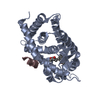
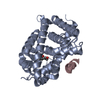
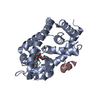
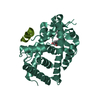



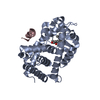
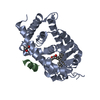




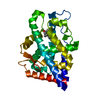
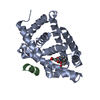
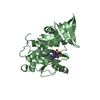
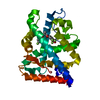
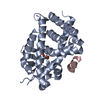

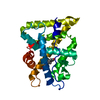
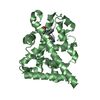
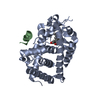
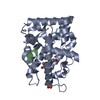
 PDBj
PDBj
